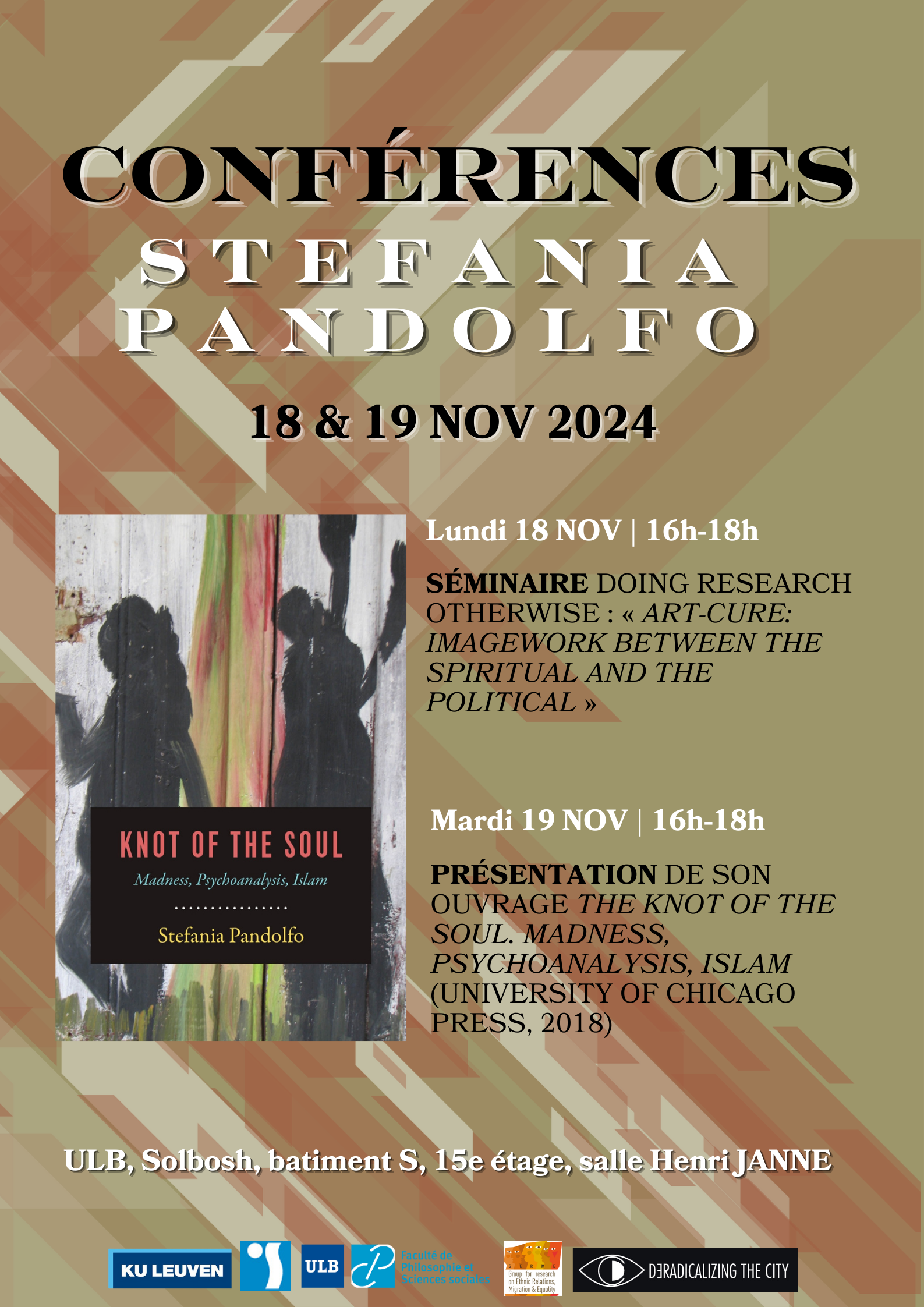-
Partager cette page
18 & 19 NOV 2024 | CONFERENCES Stéfania PANDOLFO
Nous sommes heureux d’accueillir Stefania PANDOLFO, professeure d’anthropologie à l’Université de Californie à Berkeley (voir infra pour une biographie plus détaillée), pour deux conférences à l’Institut de sociologie de l’ULB les 18 et 19 novembre 2024.
La première conférence, qui aura lieu le lundi 18 novembre de 16 à 18h en salle Henri Janne, coorganisée avec la KU Leuven au titre du séminaire Doing Research Otherwise du projet Deradicalizing the City, est intitulée « Art-Cure: Imagework Between the Spiritual and the Political ».
« My paper will reflect on what I call “art-cure” through two scenes: the first is my ethnography of psychiatric illness and liturgical healing in Morocco, through the world of Ilyas’s paintings.
A man paints mural frescos in his Rabat apartment during an episode of his illness of the psyche/soul. Later he reinterprets his visions in the mode of ta`bir and taswīr: an unconscious work of form born in the midst of crisis–psychical, mystical, political–as a force of expression, and a bridge between the visible and invisible. Ilyas’s visions are at once intimately personal and collective. They disclose a vocabulary of agentive forms, which bear witness to the forms born of crisis in the dream of a suspended collectivity.
The second moment reflects on the artistic practice of the Syrian film collective Abounaddara, whose work I am curating in collaboration with them in the exhibition The Ruins We Carry, and which I suggest, could be pondered from the perspective of the imaginal-political practices discussed above, in Abounaddara’s terms, a “utopian realist” practice. Best known for the short open access videos they made during the Syrian revolution and war, Abounaddara’s work is characterized by a capacity to capture the spiritual essence of a world through “image events”, which are visual interventions at the threshold of the invisible. Yet the group developed their practice of the animated image from an apprenticeship at the image-work of master artisans, seeking the capacity of form to disclose other worlds, at the border of the visible and the invisible, where that which cannot be said or represented can only been "shown" ».
La seconde conférence, qui aura lieu le mardi 19 novembre de 16h à 18h en salle Henri Janne, consistera en une présentation de son livre The Knot of the Soul. Madness, Psychoanalysis, Islam (University of Chicago Press, 2018), lequel a reçu le Boyer Prize de la Society for Psychoanalytic Anthropology et la mention spéciale du Fatima Mernissi Book Award de la Middle Eastern Studies Association.
Présentation du livre : « Through a dual engagement with the unconscious in psychoanalysis and Islamic theological-medical reasoning, Stefania Pandolfo’s unsettling and innovative book reflects on the maladies of the soul at a time of tremendous global upheaval. Drawing on in-depth historical research and testimonies of contemporary patients and therapists in Morocco, Knot of the Soul offers both an ethnographic journey through madness and contemporary formations of despair and a philosophical and theological exploration of the vicissitudes of the soul. Knot of the Soul moves from the experience of psychosis in psychiatric hospitals, to the visionary torments of the soul in poor urban neighborhoods, to the melancholy and religious imaginary of undocumented migration, culminating in the liturgical stage of the Qur’anic cure. Demonstrating how contemporary Islamic cures for madness address some of the core preoccupations of the psychoanalytic approach, she reveals how a religious and ethical relation to the “ordeal” of madness might actually allow for spiritual transformation. This sophisticated and evocative work illuminates new dimensions of psychoanalysis and the ethical imagination while also sensitively examining the collective psychic strife that so many communities endure today ».
Stefania PANDOLFO is a professor of Anthropology, Medical Anthropology and Critical Theory at UC Berkeley. Her recent work has focused on the articulation of psychic, spiritual and aesthetic experience in a context of violence, trauma, and madness in North Africa and the Middle East, in conversation with psychoanalysis, Islamic thought, and artistic practices. She is the author of Knot of the Soul: Madness, Psychoanalysis, Islam (Chicago 2018), and Impasse of the Angels: Scenes from a Moroccan Space of Memory (Chicago 1997), and co-author with A. Lovell, V. Das, and S. Laugier of Face aux désastres: Une conversation à quatre voix sur la folie, le care, et les grandes détresses collectives (Ithaques, Paris, 2013).
In her ethnographic exploration of imagination’s formative and transformative power, she relates to the experience of mental illness and domination in the Maghreb, and to an Islamic understanding of imagination as sensory and divine imprint in practices of healing and image-making. She guest-curated Matrix 274, a contemporary art exhibition at the Berkeley Art Museum entitled J’Accuse, featuring the work of Kader Attia (2019) and co-curated the exhibition The Ruins We Carry, featuring the image-work of the anonymous Syrian film collective Abounaddara (2024), conceived in a long collaboration with Abounaddara and premiering the three-channel film installation “The Imagemaker.”
She is currently working on a book entitled Art-Cure: Image-work at a Time of Catastrophe, based on her ethnography and collaborations with several artists.

16h-18h
ULB, Solbosh, Salle Henri Janne
16h-18h
ULB, Solbosh, Salle Henri Janne
